Pope Francis’ Cardinals From the Peripheries
NEWS ANALYSIS: In keeping with the approach displayed throughout his pontificate, the Pope names five new cardinals from nontraditional sees to reflect the universality of the Church.

Pope Francis announced May 21 that he was appointing five new members of the College of Cardinals and that they would be officially installed at an ordinary public consistory to be held in Rome on June 28.
The new cardinals are:
- Archbishop Jean Zerbo, 73, of Bamako, Mali
- Archbishop Juan Jose Omella Omella, 71, of Barcelona, Spain
- Bishop Anders Arborelius, 67, of Stockholm, Sweden
- Bishop Louis-Marie Ling Mangkhanekhoun 73, apostolic vicar of Paksé, Laos
- Bishop Gregorio Rosa Chavez, 74, auxiliary bishop of San Salvador
The announcement took almost all Vatican observers by complete surprise, as it was expected there might not be another consistory until late this year or even early next year, given the Pope’s expected travel schedule in the fall.
Four of the new members come from countries that have never received a red hat, two — from Sweden and Laos — are from regions where the Catholic population is truly tiny, and one, from El Salvador, is unprecedented for being only an auxiliary bishop at the time of his appointment.
All save Cardinal-elect Omella come from areas where the Church has faced or is facing persecution and various forms of legal, social and political disabilities.
This will be Pope Francis’ fourth consistory since his election and brings to a total 49 cardinal-electors appointed during his pontificate. Cardinal-electors are cardinals under the age of 80 and therefore eligible to vote in a conclave to elect the next pope.
In all, Francis has named 40% of all the cardinal-electors. This means that within another year or two, he will have chosen the majority of electors who will someday gather to choose his successor.
While it is certainly true that Francis has made some genuinely unique appointments to the cardinalate, in one way he has respected tradition, in that, with the new consistory, there will be 227 cardinals, with 121 of them electors — only one above the maximum established by Pope Paul VI. That is a limit that, while surpassed by Pope John Paul II on a few occasions, has been largely respected by recent popes, including Francis.
A Universal Church
At his announcement of the five new cardinals at the Regina Caeli, Pope Francis said: “I wish to announce that on Wednesday, June 28, I will hold a consistory for the appointment of five new cardinals. Their origin from various parts of the world manifests the catholicity of the Church spread out across the whole earth.”
Francis’ choice of cardinals reflects a genuine commitment to the universal Church and makes certain that every corner of global Catholicism is represented and heard.
In his four consistories, he has chosen cardinals literally from all over the world: seven from Africa, seven from Asia, six from South America, six from Central America, four from North America, three from Oceania and one from the Middle East (technically an Italian, Archbishop Mario Zenari, apostolic nuncio to Syria, who was named to express the Pope’s solidarity with the suffering in Syria and to elevate his nuncio’s diplomatic profile).
But he has also named 15 Europeans, including six Italians, as well as various officials of the Holy See, meaning he is still aware of the vital role Europe must play in the Church.
As he has done in the past, in his new choices, Francis bypassed larger archdioceses in favor of prelates from places that have never had a cardinal. He also doesn’t feel bound by the long-established custom of appointing new cardinals from so-called “cardinalatial sees” — dioceses or archdioceses where the “red hat” of the cardinal is assumed.
Instead, Francis relies on the personal qualities of bishops and archbishops, most notably shepherds with pastoral focus who can be trusted to give advice from their unique perspectives.
Especially surprising this time is his choice of Bishop Chavez of San Salvador, who is the first auxiliary bishop to become a cardinal. Bishop Chavez has confronted violence in El Salvador and was a friend and protégé of the martyred archbishop Blessed Oscar Romero.
The Church in the Peripheries
Looking deeper into Francis’ choices, Francis has a global perspective, but more than mere internationalization, he is promoting new cardinals from poor countries, areas that have never had a cardinal before, or parts of the world in crisis: in a word, cardinals from the peripheries — the periferia — whose flocks face poverty, exclusion or marginalization.
In 2015, he said at the consistory: “I urge you to serve Jesus crucified in every person who is emarginated, for whatever reason; to see the Lord in every excluded person who is hungry, thirsty, naked … to see the Lord who is imprisoned, sick, unemployed, persecuted; to see the Lord in the leper — whether in body or soul — who encounters discrimination! We will not find the Lord unless we truly accept the marginalized!”
Among the cardinals chosen by Francis who highlight the peripheries are Chibly Langlois, bishop of Les Cayes, Haiti, who was named in 2014, and Soane Patita Paini Mafi, bishop of Tonga, who was named in 2015 and heads a diocese of only 14,000 Catholics.
In this new class is Cardinal-elect Arborelius of Sweden, who leads a small flock — barely 1% of his country’s total population — but is nevertheless on the forefront of the secularizing trends in Europe in general and Scandinavia in particular.
The Church Suffering
Francis has also chosen cardinals from areas where the Church is enduring terrible persecutions and violence. Cardinal Alberto Suárez Inda of Morelia, appointed in 2015, serves in a part of Mexico plagued by staggering crimes by the drug cartels. Salesian Cardinal Charles Maung Bo of Yangon, Myanmar, named in 2015, is shepherd to 76,000 Catholics in a country ruled by a military dictatorship.
Pope Francis has just named Cardinal-elect Mangkhanekhoun of Laos, where Catholics have long been persecuted by the Marxist regime and make up 1% of the population. Similarly, Cardinal-elect Zerbo of Mali serves his 138,000-member community in a Muslim-majority country where sharia (Islamic law) is being increasingly imposed. Francis wants these voices to be heard in an era of intensifying persecution for Christians.
When the cardinals gather in late June, Francis will likely deliver a message similar to the one he gave the new cardinals in 2014 at his first consistory: “The cardinalate does not signify a promotion, an honor nor a decoration: It is simply a service that demands a broader vision and a bigger heart. And, although it seems a paradox, this ability to look further and love more universally with greater intensity can be acquired only by following the way of the Lord: the way of lowliness and of humility, taking the form of a servant (Philippians 2:5-8). Therefore, I ask you, please, receive this appointment with a simple and humble heart. And, while you ought to do this with gladness and joy, do so in a way that this sentiment is far from any kind of expression of worldliness, from any celebration alien to the evangelical spirit of austerity, moderation and poverty.”
The New Cardinals
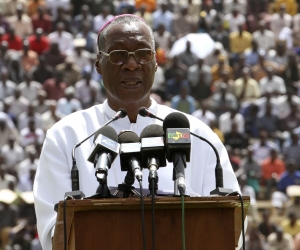
Cardinal-elect Zerbo is deeply respected as a leader in promoting reconciliation in Mali, especially during the bloody civil war that officially ended in 2015. He was a member of the civil delegation that met in Burkina Faso to bring peace between the military regime and political opposition parties. He has also promoted dialogue with Muslims at a time when sharia law is being imposed on Christians, despite the constitutional guarantees in Mali for freedom of religion.
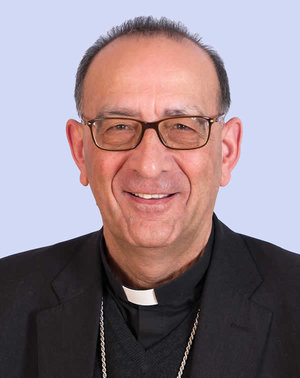
Archbishop Juan José Omella Omella was born on April 21, 1946, in the small Spanish town of Cretas.
He studied for the priesthood in Zaragoza, at the Catholic University in Louvain, Belgium, and in Jerusalem. He was ordained in 1970. After a brief time of parish service in Spain, he spent a year as a missionary in what was then Zaire, modern Congo.
Named an auxiliary bishop of Zaragoza in 1996, he was promoted to bishop of Barbastro-Monzon in 1999 and then bishop of Calahorra and La Calzada-Logrorio. In addition, he served as the apostolic administration of Huesca and Jaca. Pope Francis named him archbishop of Barcelona in 2015. He is also a member of the Vatican Congregation for Bishops.
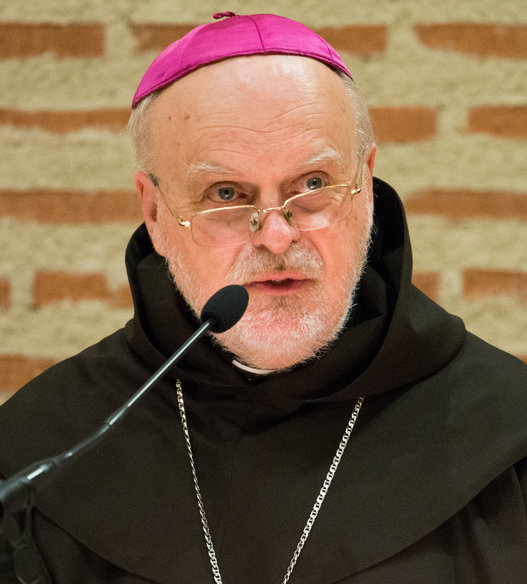
Bishop Anders Arborelius was born in Sweden on Sept. 24, 1949. Raised a Lutheran, he joined the Catholic Church at the age of 20, entered the Discalced Carmelites a few years later, and took his final vows in 1977. He was ordained to the priesthood in 1979 and became bishop of Stockholm in 1998, the first native Swede to be a bishop in Sweden since the Protestant Reformation. He is shepherd to a flock that is a growing combination of native Swedes and immigrants, who now total more than 200,000 Catholics in 44 parishes.
He also welcomed Pope Francis on his visit to Sweden in October as part of the ecumenical commemoration of the 500th anniversary of the Reformation. The new cardinal is a veteran of EWTN, having appeared on several television series. He was also interviewed by the Register last fall.
Bishop Louis-Marie Ling Mangkhanekhoun was born April 8, 1944, in Laos and studied in his native country and in New Brunswick, Canada, in the Diocese of Edmundston.
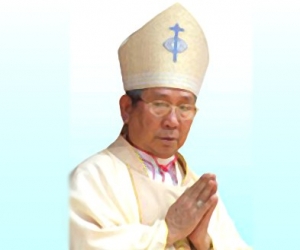
Ordained to the priesthood in 1972 by the apostolic vicar of Vientiane, he earned a reputation for his pastoral zeal, especially in traveling into the most remote parts of Laos to bring the sacraments. Named apostolic vicar of Paksé in 2000 and ordained a bishop in April 2001, he has also served as apostolic administrator of the Apostolic Vicariate of Vientiane since February and is president of the Episcopal Conference of Laos and Cambodia. He is much respected for his deep pastoral concern and his efforts on behalf of Laos’ tiny Catholic population in the face of persecution.
In December 2016, he took part in the beatification of 17 Laotian martyrs, including priests, religious and laypeople, who were martyred for the faith between 1954 and 1970 by Communist Pathet Lao forces. Among the new “Blesseds” was Luc Sy (1938–1970), a layman and catechist, who was also the new cardinal’s cousin.
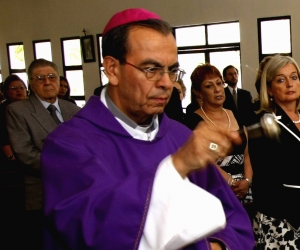
He is the first auxiliary bishop to be named a cardinal. In an interview with SIR, Servizio Informazione Religiosa, he dedicated his appointment to Blessed Romero and visited his tomb to ask the martyred archbishop to accompany him in this new stage of his pastoral life.
Matthew E. Bunson is a senior editor with the Register
and senior contributor to EWTN News.
- Keywords:
- cardinals
- matthew bunson
- pope francis
















